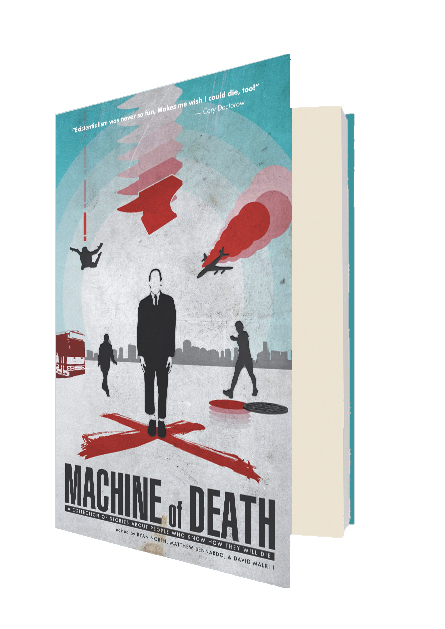Given a sample of blood, a machine prints out the cause of a person’s death on a small piece of paper. But the results are brief and deceptive: old age can mean getting killed by an elderly person. “Almond” is narrated by a lab technician in Cleveland who begins to record a maintenance log for a machine of death (as the device is called), but who is soon so overwhelmed by the monotony of the job that he spends the year contemplating, say, how a word so seemingly innocuous as almond could be fatal. When a man receives joy as a readout from the machine, the technician envisions a death from intense ecstasy, only to discover later that the man has died when struck by a car driven by a woman named Joy. Horrified, he wonders why the machine would choose this detail over something more appropriate, like crash.
On the surface, it’s easy to say that this story and the others in Machine of Death: A Collection of Stories About People Who Know How They Will Die demonstrate a skepticism toward technology. As his last act in “Almond,” in a sleep-deprived rage, the lab technician destroys the machine. (It’s a symbolic gesture.) The machine itself is the red herring, however: language is the technology that deserves this suspicion. The machine shows us only that language can fail. It’s fairer to say that the rules of the machine, which allow for imaginative interpretations, give the writers of these stories freedom to challenge language, word by word. In the meantime, their characters parse the machine’s words to the point of obsession, imagining all the possibilities of their eventual demises, knowing that a readout does not refer only to its most apparent meaning. What if it’s a metaphor? What if it refers to a line of poetry?
The most extreme example is “Heat Death of the Universe,” a meditation on cosmology and a high-school love story (an oddly appropriate combination). The narrator and his girlfriend must balance the normal pressures of adolescence with apocalyptic visions of their deaths. She has received nuclear bomb, he the titular fate. A bookish outcast fascinated by the cosmology of Stephen Hawking, the narrator can’t understand the logistics of his readout: heat death presupposes the temperature of the universe lowering to the point where it can no longer sustain life—suggesting either that the narrator will live...
You have reached your article limit
Sign up for a digital subscription and continue reading all new issues, plus our entire archives, for just $1.50/month.
Already a subscriber? Sign in





